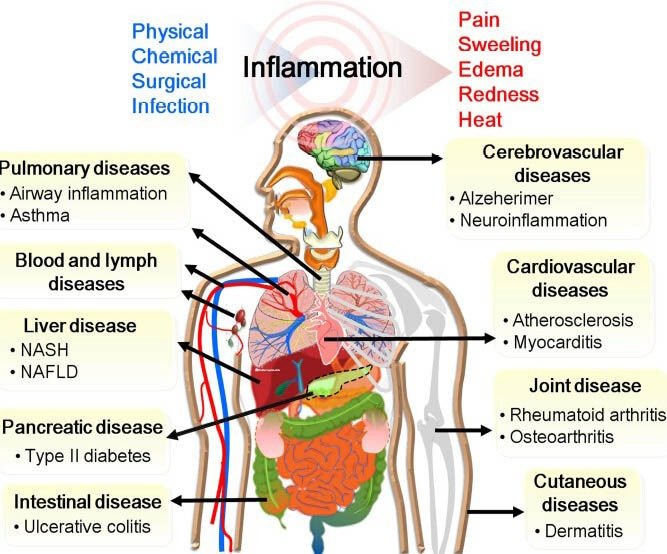
For those who are not aware of what inflammation can do to your body, have a look at the image above. Just a glimpse of it can give you shivers throughout your body.
Can you see any part of your body left out? NO!
Do you know why? Because it's an integral part of your body’s defense system. It's there to fight with external infections and to heal our body ASAP, so it’s omnipresent in our body.
Wait a min……..if it’s meant to heal us, then how come it’s killing us?
Confused?
Let’s dig in…..Drumroll 🥁
Inflammation is a complex and vital process of your body to protect and heal itself. It's your natural defense mechanism against injury and infection. When you suffer a cut or encounter an infection, your body's defense system comes into action.
It dispatches white blood cells to the affected area. When this happens, you see redness, swelling, pain, and heat in that area. This happens because our body is fighting from external pathogens and is trying to heal it as fast as it can.
But there's another aspect to it as well. Let's uncover that.....
Types of Inflammation:
1. Acute Inflammation:
It's your body's immediate, but short-term defense mechanism against injury or infection. It resolves within hours to days as the body heals.
2. Chronic Inflammation:
Unlike acute inflammation, chronic inflammation persists over time, often without clear symptoms. It can happen due to:
Persistent infections,
unresolved acute inflammation,
Long-term exposure to irritants (like pollutants or industrial chemicals),
Autoimmune disorders (where the immune system mistakenly attacks healthy tissues),
Lifestyle factors, such as poor diet, lack of exercise, stress, and smoking.
This ongoing state can lead to various health issues, like:
Heart disease,
Diabetes,
Cancer,
Arthritis
Alzheimer's disease
This is the inflammation we have to be careful of. Let's not stop here. Let's find out…….
What causes Inflammation?
1. Diet:
High sugar intake and refined carbohydrates can trigger inflammatory responses.
Unhealthy fats found in processed foods can trigger inflammatory responses.
Food sensitivities (gluten or dairy) can lead to low-grade inflammation in few individuals.
2. Lifestyle Choices:
A sedentary lifestyle lacking physical activity increases inflammation levels.
Chronic stress releases hormones that exacerbate this condition.
On top of it, poor sleep quality disrupts the body's natural healing processes.
3. Environmental Factors:
Exposure to toxins such as pesticides and heavy metals can induce inflammation.
Frequent infections also keep the immune system in a heightened state of alertness.
Now that we know what causes it, let's understand the…………………
Impact of Chronic Inflammation on your Health:
While acute inflammation is essential for healing, chronic inflammation poses serious health risks:
1. Increased Risk of Disease:
Due to persistent inflammation in body, one becomes prone to:
heart disease,
cancer,
Alzheimer’s disease, and
autoimmune disorders.
2. Accelerated Aging:
Chronic Inflammation contributes to cellular damage. Those suffering from it face age-related decline much faster than others.
3. FLC Syndrome:
With chronic inflammation, you start feeling like crap. That's what FLC syndrome is. You start experiencing fatigue, brain fog, joint pain, and digestive issues.
Enough of what it can do to you. Let’s dig in………
How can we prevent ourselves from chronic Inflammation?
1. Dietary Adjustments:
1.1. Consume Whole Foods:
Emphasize fruits, vegetables, whole grains, lean proteins, and healthy fats. These foods are rich in antioxidants that help combat inflammation.
1.2. Limit Processed Foods:
Reduce intake of sugary drinks and unhealthy fats that contribute to inflammatory processes.
1.3. Identify Food Sensitivities:
Use elimination diet to pinpoint any food triggers that may be causing inflammation.
2. Lifestyle Changes:
2.1. Regular Exercise:
Aim for at least 30 minutes of moderate exercise most days to lower inflammation levels.
2.2. Stress Management:
Incorporate relaxation techniques like meditation or yoga into your routine.
2.3. Quality Sleep:
Strive for 7-9 hours of restful sleep each night; establish a calming bedtime routine.
3. Bonus Strategies:
3.1. Reduce Toxin Exposure:
Opt for natural cleaning products and organic foods when possible.
3.2. Support Gut Health:
Fiber-rich diet can promote a healthy gut microbiome;
Probiotics may also be beneficial after consulting with a healthcare provider.
3.3. Consider Supplements:
Omega-3 fatty acids and Vitamin-D helps mitigate inflammation. Don’t consume without your doctor’s consultation.
Now before you leave, tell me one thing you'll change in your life today, to reduce inflammation in your body.



